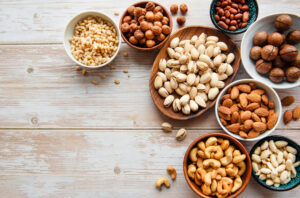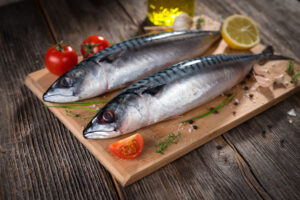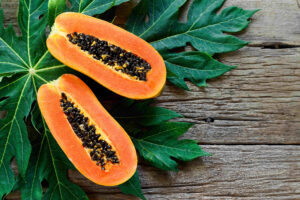Your immune system is your body’s natural defense, working around the clock to fight off infections and keep you healthy. The good news? What you eat can make a big difference.
Foods rich in vitamin C, zinc, and antioxidants—like citrus fruits, leafy greens, nuts, and yogurt—help strengthen immune cells, reduce inflammation, and support gut health. Probiotics from fermented foods boost good bacteria in your gut, a key player in immunity.
A well-balanced diet packed with these powerful nutrients can help you fight off colds, recover faster from illness, and maintain overall well-being.
In this guide, we’ll explore some of the best immune-boosting foods and how they work to keep you healthy.
Immune-Boosting Foods
Below are some of the most nutritious foods that help strengthen immunity.
1. Citrus Fruits
Citrus fruits like oranges, lemons, limes, grapefruits, and tangerines are known for their immune-boosting properties.
They are loaded with vitamin C, which enhances immune function by acting as an antioxidant and supporting the activity of lymphocytes, a type of white blood cell. It plays a role in modulating immune responses, promoting antibody production, and influencing NK cell activity.
Here is the vitamin C content of some of the most consumed citrus fruits:
- A medium-sized orange (131 grams) provides about 70 mg, covering 78% of the DV.
- One half of a grapefruit (128 grams) contains 44 mg, or 49% of the DV.
- One large tangerine (120 grams) delivers 32 mg, which is 36% of the DV.
- Lemons & Limes – While not usually eaten whole, their juice adds a vitamin C boost to dishes and drinks.
Regular consumption of citrus fruits may help reduce the duration and severity of colds and improve overall immune function.
2. Garlic
Garlic has been used for centuries as a natural remedy due to its antimicrobial and immune-boosting properties.
Garlic is rich in organosulfur compounds like allicin, which strengthens the immune system by activating key immune cells and defense mechanisms.
Studies suggest that regular garlic consumption can reduce the severity colds and even shorten their duration.
It also contains fructooligosaccharides (FOS), a type of fructan that boosts immune function by stimulating immune responses and acting as a prebiotic.
For maximum benefits, crush or chop garlic cloves and let them sit for a few minutes before cooking to activate the beneficial compounds.
3. Ginger
Ginger has been traditionally used to relieve cold, flu, and respiratory infections, thanks to its ability to support immune balance, fight inflammation, and reduce oxidative stress.
It contains bioactive compounds like gingerols, shogaols, and paradols, which provide potent immunomodulatory and anti-inflammatory effects.
These compounds help regulate the immune system by reducing pro-inflammatory cytokines and increasing anti-inflammatory cytokines.
Simply brew a cup of ginger tea for a natural immunity boost—add a squeeze of lemon for even more benefits!
4. Yogurt
A strong immune system starts in the gut, and probiotic-rich foods like yogurt help maintain a balanced gut microbiome. Probiotics support the production of beneficial bacteria, which play a key role in immune function.
Choose plain yogurt with live and active cultures instead of flavored varieties that are high in added sugar. Fresh yogurt with live bacteria offers additional immune benefits by enhancing specific immune responses more effectively than pasteurized options. For a naturally sweet and antioxidant-rich boost, add berries or other fresh fruits.
Greek yogurt is also a great choice due to its higher calcium content.
5. Berries
Berries, including strawberries, blueberries, blackberries, and elderberries, are packed with antioxidants that help protect immune cells from damage.
They are rich in vitamin C, polyphenols, flavonoids, and anthocyanins, which have been linked to reduced inflammation and improved immune response.
Studies show that goji berries enhance B cell activity, cranberries increase γδ-T cells, and chokeberries stimulate phagocytic and T cell responses. Grape and elderberry extracts were also found to boost immune defenses.
γδ-T cells, B cells, and T cells are types of white blood cells, specifically lymphocytes, that help strengthen the immune system and defend against infections.
Additionally, berries contain resveratrol, a polyphenol that helps regulate immunity by influencing immune cell activity, cytokine production, and gene expression.
6. Turmeric
Turmeric contains curcumin, a potent compound known for its antimicrobial, anti-inflammatory, and immunomodulatory properties. It works with key immune cells like macrophages, dendritic cells, B cells, and T cells, helping regulate immune responses.
Curcumin reduces pro-inflammatory cytokines, increases anti-inflammatory cytokines, and helps combat oxidative stress, supporting overall immunity.
Research suggests curcumin may enhance immune defense against infections and inflammatory conditions, making turmeric a valuable addition to an immune-boosting diet.
Curcumin isn’t easily absorbed on its own, but when combined with black pepper (which contains piperine), its bioavailability increases by up to 20 times.
7. Spinach and Leafy Greens
Spinach, kale, and other leafy greens are loaded with vitamin C, K, beta-carotene, and antioxidants that strengthen the immune system. Beta-carotene is an antioxidant that body converts into vitamin A when we consume it.
Vitamin C supports lymphocyte function and enhances antibody production, while vitamin A helps regulate T cells, B cells, and cytokine release.
8. Nuts and Seeds
Nuts and seeds, such as almonds, sunflower seeds, and pumpkin seeds, are excellent sources of vitamin E, zinc, and omega-3 fatty acids, all of which support immune function.
- Almonds – High in vitamin E, a fat-soluble antioxidant boosts immunity by reducing inflammation.
- Sunflower Seeds – Packed with vitamin E, and selenium, another antioxidant that boosts immunity by regulating inflammatory cytokines and reducing oxidative stress, supporting overall immune function.
- Pumpkin Seeds– A great source of zinc, which plays a key role in immune response.
A small handful (an ounce-28 grams) of mixed nuts and seeds daily can provide essential nutrients for immunity.
9. Green Tea
Green tea is rich in polyphenols like EGCG and ECG, which help strengthen the immune system, reduce inflammation, and lower the risk of immune disorders.
It also contains L-theanine, an amino acid that helps prevent colds and flu by strengthening immunity. It supports immune function by regulating γδT lymphocytes and enhancing glutathione synthesis.
Squeezing a wedge of lemon further enhances the immune-boosting properties of green tea. Learn more about its benefits in this guide!
10. Mushrooms
Mushrooms, especially shiitake, maitake, and reishi, contain beta-glucans—a type of fiber that boosts immunity and reduces inflammation.
They are also rich in vitamin D, B vitamins, and selenium, all of which contribute to better immune health.
A study using both lab and animal models tested five common edible mushrooms and found that all stimulated macrophages to produce TNF-α, with white button mushrooms having the strongest effect. In mice, white button mushrooms helped protect against DSS-induced colonic injury, showing mild but beneficial immune effects.
Similarly, an animal study tested proteins from 13 rare and 9 common edible mushrooms for their immune-boosting effects. The results showed that they enhanced macrophage activity, increased inflammatory cytokines, and strengthened immunity, with rare mushrooms being more effective.
Adding mushrooms to soups, stir-fries, or roasting them enhances both flavor and health benefits.
11. Fatty Fish
Fatty fish like salmon, mackerel, and sardines are excellent sources of omega-3 fatty acids, which help regulate immune function and reduce inflammation.
Omega-3 fatty acids strengthen the immune system by helping white blood cells fight infections, supporting immune balance, and aiding the production of antibodies.
Having 2-3 servings of fatty fish per week provides essential nutrients for a stronger immune system.
12. Red Bell Peppers
Did you know that red bell peppers contain even more vitamin C than oranges? A 100-gram serving of red bell pepper provides 158% of the DV of vitamin C, making it one of the best sources for this immune-boosting nutrient.
Red bell peppers are also rich in beta-carotene, which supports skin health and immune defenses.
13. Dark Chocolate
Dark chocolate (with at least 70% cocoa) contains theobromine, an antioxidant that boosts immunity by activating key pathways and stimulating the production of nitric oxide and cytokines.
Furthermore, cocoa consumption supports gut-associated immune function by regulating IgA production and promoting a balanced gut microbiota.
Dark Chocolate is also an excellent source of magnesium, iron, and flavonoids, making it a great option during the menstrual cycle.
While it should be eaten in moderation (1 ounce-28 grams) due to its calorie content, small amounts of dark chocolate can provide immune-supporting benefits.
14. Sweet Potatoes
Sweet potatoes are rich in beta-carotene, a precursor to vitamin A, which plays a crucial role in immune function. Vitamin A helps maintain the integrity of the skin and mucous membranes, the body’s first line of defense against pathogens.
15. Papaya
Papaya is another fruit high in vitamin C, providing over 100% of the daily value in just one cup. It also contains papain, an enzyme with anti-inflammatory properties that supports digestion and immune function.
Additionally, papaya is rich in bioactive compounds that help reduce inflammation, oxidative stress, and viral replication, making it a promising natural antiviral remedy. It has also shown potential against viruses like dengue, COVID-19, HIV, and Zika.
16. Poultry
Poultry, such as chicken and turkey, is rich in high-quality protein, and essential nutrients like vitamin B3, B6, and selenium, all of which play a crucial role is improving immune function. A 3.5-ounce (100-gram) serving of chicken breast provides more than half of the daily requirement of these essential nutrients.
While all three nutrients regulate inflammatory cytokines to boost immunity, vitamin B3 enhances the innate immune system up to 1000-fold, vitamin B6 supports antibody production, and selenium helps white blood cells function properly while reducing oxidative stress, all playing key roles in immune defense.
Additionally, chicken broth contains gelatin and amino acids that aid gut health, further strengthening immunity.
Including poultry in your diet can help maintain a strong and responsive immune system.
17. Honey
Honey is renowned for its immune-boosting properties, thanks to its natural antibacterial, antiviral, and antioxidant effects.
It strengthens immunity by promoting the growth of T and B lymphocytes, stimulating phagocytosis, regulating pro-inflammatory cytokines, and reducing oxidative stress. Its antimicrobial compounds, like hydrogen peroxide and flavonoids, help fight infections.
Adding raw honey to your diet can naturally strengthen your body’s defenses against illness.
Final Thoughts
A well-balanced diet filled with nutrient-dense foods is one of the best ways to support your immune system.
Incorporating a variety of vitamin C-rich foods, antioxidant-packed vegetables, probiotic-rich foods, and healthy fats can help your body stay strong and resilient.
While no single food can prevent illness, maintaining a diet rich in immune-boosting nutrients, along with good sleep, stress management, and exercise, can significantly enhance your body’s natural defenses.
References:
- U.S. Department of Agriculture FoodData Central
- Mitra S, Paul S, Roy S, Sutradhar H, Bin Emran T, Nainu F, Khandaker MU, Almalki M, Wilairatana P, Mubarak MS. Exploring the Immune-Boosting Functions of Vitamins and Minerals as Nutritional Food Bioactive Compounds: A Comprehensive Review. Molecules. 2022 Jan 16;27(2):555. doi: 10.3390/molecules27020555. PMID: 35056870; PMCID: PMC8779769. Used under CC BY 4.0.
- Arreola R, Quintero-Fabián S, López-Roa RI, Flores-Gutiérrez EO, Reyes-Grajeda JP, Carrera-Quintanar L, Ortuño-Sahagún D. Immunomodulation and anti-inflammatory effects of garlic compounds. J Immunol Res. 2015;2015:401630. doi: 10.1155/2015/401630. Epub 2015 Apr 19. PMID: 25961060; PMCID: PMC4417560. Used under CC BY 3.0.
- Yücel Ç, Karatoprak GŞ, Açıkara ÖB, Akkol EK, Barak TH, Sobarzo-Sánchez E, Aschner M, Shirooie S. Immunomodulatory and anti-inflammatory therapeutic potential of gingerols and their nanoformulations. Front Pharmacol. 2022 Sep 5;13:902551. doi: 10.3389/fphar.2022.902551. PMID: 36133811; PMCID: PMC9483099. Used under CC BY 4.0.
- Rivero-Pino F, Casquete M, Castro MJ, Redondo Del Rio P, Gutierrez E, Mayo-Iscar A, Nocito M, Corell A. Prospective, Randomized, Double-Blind Parallel Group Nutritional Study to Evaluate the Effects of Routine Intake of Fresh vs. Pasteurized Yogurt on the Immune System in Healthy Adults. Nutrients. 2024 Jun 20;16(12):1969. doi: 10.3390/nu16121969. PMID: 38931322; PMCID: PMC11206341. Used under CC BY 4.0.
- Vahapoglu B, Erskine E, Gultekin Subasi B, Capanoglu E. Recent Studies on Berry Bioactives and Their Health-Promoting Roles. Molecules. 2021 Dec 24;27(1):108. doi: 10.3390/molecules27010108. PMID: 35011338; PMCID: PMC8747047. Used under CC BY 4.0.
- Malaguarnera L. Influence of Resveratrol on the Immune Response. Nutrients. 2019 Apr 26;11(5):946. doi: 10.3390/nu11050946. PMID: 31035454; PMCID: PMC6566902. Used under CC BY 4.0.
- Allegra A, Mirabile G, Ettari R, Pioggia G, Gangemi S. The Impact of Curcumin on Immune Response: An Immunomodulatory Strategy to Treat Sepsis. Int J Mol Sci. 2022 Nov 25;23(23):14710. doi: 10.3390/ijms232314710. PMID: 36499036; PMCID: PMC9738113. Used under CC BY 4.0.
- El-Saadony MT, Yang T, Korma SA, Sitohy M, Abd El-Mageed TA, Selim S, Al Jaouni SK, Salem HM, Mahmmod Y, Soliman SM, Mo’men SAA, Mosa WFA, El-Wafai NA, Abou-Aly HE, Sitohy B, Abd El-Hack ME, El-Tarabily KA, Saad AM. Impacts of turmeric and its principal bioactive curcumin on human health: Pharmaceutical, medicinal, and food applications: A comprehensive review. Front Nutr. 2023 Jan 10;9:1040259. doi: 10.3389/fnut.2022.1040259. PMID: 36712505; PMCID: PMC9881416. Used under CC BY 4.0.
- Wang S, Li Z, Ma Y, Liu Y, Lin CC, Li S, Zhan J, Ho CT. Immunomodulatory Effects of Green Tea Polyphenols. Molecules. 2021 Jun 20;26(12):3755. doi: 10.3390/molecules26123755. PMID: 34203004; PMCID: PMC8234133. Used under CC BY 4.0.
- Chen S, Kang J, Zhu H, Wang K, Han Z, Wang L, Liu J, Wu Y, He P, Tu Y, Li B. L-Theanine and Immunity: A Review. Molecules. 2023 May 1;28(9):3846. doi: 10.3390/molecules28093846. PMID: 37175254; PMCID: PMC10179891. Used under CC BY 4.0.
- Cerletti C, Esposito S, Iacoviello L. Edible Mushrooms and Beta-Glucans: Impact on Human Health. Nutrients. 2021 Jun 25;13(7):2195. doi: 10.3390/nu13072195. PMID: 34202377; PMCID: PMC8308413. Used under CC BY 4.0.
- Yu, S., Weaver, V., Martin, K. et al. The effects of whole mushrooms during inflammation. BMC Immunol 10, 12 (2009). https://doi.org/10.1186/1471-2172-10-12. Used under CC BY 2.0.
- Xu J, Xu D, Hu Q, Ma N, Pei F, Su A, Ma G. Immune regulatory functions of biologically active proteins from edible fungi. Front Immunol. 2023 Jan 12;13:1034545. doi: 10.3389/fimmu.2022.1034545. PMID: 36713368; PMCID: PMC9878603. Used under CC BY 4.0.
- Gutiérrez S, Svahn SL, Johansson ME. Effects of Omega-3 Fatty Acids on Immune Cells. Int J Mol Sci. 2019 Oct 11;20(20):5028. doi: 10.3390/ijms20205028. PMID: 31614433; PMCID: PMC6834330. Used under CC BY 4.0.
- Lee HW, Choi IW, Ha SK. Immunostimulatory Activities of Theobromine on Macrophages via the Activation of MAPK and NF-κB Signaling Pathways. Curr Issues Mol Biol. 2022 Sep 12;44(9):4216-4228. doi: 10.3390/cimb44090289. PMID: 36135201; PMCID: PMC9498265. Used under CC BY 4.0.
- Pérez-Cano FJ, Massot-Cladera M, Franch A, Castellote C, Castell M. The effects of cocoa on the immune system. Front Pharmacol. 2013 Jun 4;4:71. doi: 10.3389/fphar.2013.00071. PMID: 23759861; PMCID: PMC3671179. Used under CC BY 4.0.
- Srivastava R, Jaiswal N, Kharkwal H, Dubey NK, Srivastava R. Phytomedical Properties of Carica papaya for Boosting Human Immunity Against Viral Infections. Viruses. 2025 Feb 16;17(2):271. doi: 10.3390/v17020271. PMID: 40007026; PMCID: PMC11861161. Used under CC BY 4.0.
- Al-Hatamleh MAI, Hatmal MM, Sattar K, Ahmad S, Mustafa MZ, Bittencourt MC, Mohamud R. Antiviral and Immunomodulatory Effects of Phytochemicals from Honey against COVID-19: Potential Mechanisms of Action and Future Directions. Molecules. 2020 Oct 29;25(21):0. doi: 10.3390/molecules25215017. PMID: 33138197; PMCID: PMC7672575. Used under CC BY 4.0.






